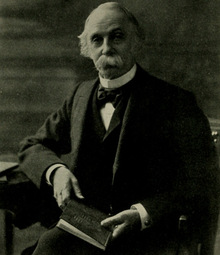
Timothy Dwight was an American academic and educator, a Congregationalist minister, theologian, and author. He was the eighth president of Yale College (1795–1817).
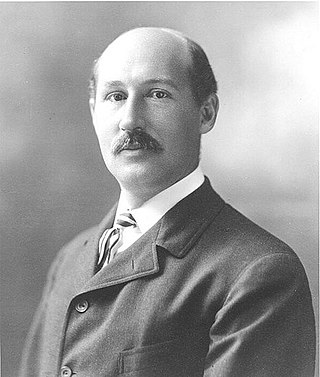
Walter Chauncey Camp was an American college football player and coach, and sports writer known as the "Father of American Football". Among a long list of inventions, he created the sport's line of scrimmage and the system of downs. With John Heisman, Amos Alonzo Stagg, Pop Warner, Fielding H. Yost, and George Halas, Camp was one of the most accomplished persons in the early history of American football. He attended Yale College, where he played and coached college football. Camp's Yale teams of 1888, 1891, and 1892 have been recognized as national champions. Camp was inducted into the College Football Hall of Fame as a coach during 1951.
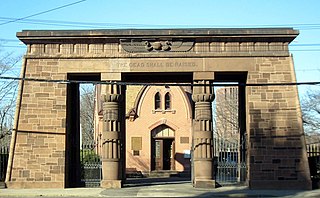
Grove Street Cemetery or Grove Street Burial Ground is a cemetery in New Haven, Connecticut, that is surrounded by the Yale University campus. It was organized in 1796 as the New Haven Burying Ground and incorporated in October 1797 to replace the crowded burial ground on the New Haven Green. The first private, nonprofit cemetery in the world, it was one of the earliest burial grounds to have a planned layout, with plots permanently owned by individual families, a structured arrangement of ornamental plantings, and paved and named streets and avenues. By introducing ideas like permanent memorials and the sanctity of the deceased body, the cemetery became "a real turning point... a whole redefinition of how people viewed death and dying", according to historian Peter Dobkin Hall. Many notable Yale and New Haven luminaries are buried in the Grove Street Cemetery, including 14 Yale presidents; nevertheless, it was not restricted to members of the upper class, and was open to all.

Othniel Charles Marsh was an American professor of paleontology at Yale College and president of the National Academy of Sciences. He was one of the preeminent scientists in the field of paleontology. Among his legacies are the discovery or description of dozens of new species and theories on the origins of birds.

Daniel Coit Gilman was an American educator and academic. Gilman was instrumental in founding the Sheffield Scientific School at Yale College, and subsequently served as the second president of the University of California, Berkeley, as the first president of Johns Hopkins University, and as founding president of the Carnegie Institution.

Turtle was the world's first submersible vessel with a documented record of use in combat. It was built in 1775 by American David Bushnell as a means of attaching explosive charges to ships in a harbor, for use against the Royal Navy during the American Revolutionary War. Connecticut Governor Jonathan Trumbull recommended the invention to George Washington, who provided funds and support for the development and testing of the machine.
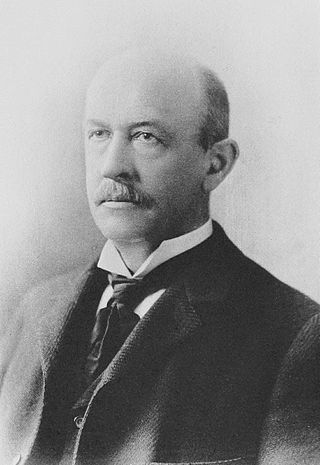
William Graham Sumner was an American clergyman, social scientist, and classical liberal. He taught social sciences at Yale University—where he held the nation's first professorship in sociology—and became one of the most influential teachers at any other major school.
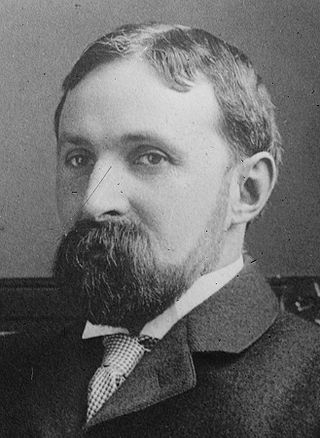
Albert Bushnell Hart was an American historian, writer, and editor based at Harvard University. One of the first generation of professionally trained historians in the United States, a prolific author and editor of historical works, Albert Bushnell Hart became, as Samuel Eliot Morison described him, "The Grand Old Man" of American history, looking the part with his "patriarchal full beard and flowing moustaches."

George Trumbull Ladd was an American philosopher, educator and psychologist.

Horace Bushnell was an American Congregational minister and theologian.

Yale Divinity School (YDS) is one of the twelve graduate and professional schools of Yale University in New Haven, Connecticut.

Connecticut Hall is a Georgian building on the Old Campus of Yale University. Completed in 1752, it was originally a student dormitory, a function it retained for 200 years. Part of the first floor became home to the Yale College Dean's Office after 1905, and the full building was converted to departmental offices in the mid-twentieth century. It is currently used by the Department of Philosophy, and its third story contains a room for meetings of the Yale Faculty of Arts & Sciences, the academic faculty of Yale College and the Graduate School.
The Theodore Roosevelt Cyclopedia is a comprehensive project to publish, in one collection, the significant sayings, important conversations and writings of the 26th President of the United States, Theodore Roosevelt. Originally conceived by Dr. Albert Bushnell Hart, a history professor at Harvard University, a personal friend of Roosevelt and member of the Roosevelt Memorial Association, now known as the Theodore Roosevelt Association, Hart's goal was, in his words, to "present in alphabetical arrangement, extracts sufficiently numerous and comprehensive to display all the phases of (Theodore) Roosevelt's activities and opinions as expressed by him." A primitive on-line version of the original work is also maintained by the TRA. Online but quite primitive version of the Cyclopedia at the Theodore Roosevelt Association web site with no look-up features
Benjamin Wisner Bacon was an American theologian. He was born in Litchfield, Connecticut and graduated from Yale College in 1881 and Yale Divinity School in 1884. After serving in pastorates at Old Lyme, Connecticut (1884–1889), and at Oswego, New York (1889–1896), he was made an instructor in New Testament Greek at Yale Divinity School and became in 1897 professor of New Testament criticism and exegesis. The degrees D.D., Litt.D., and LL.D. were conferred upon him. Besides contributions to the Hibbert Journal and to the American Journal of Theology, his writings include:

George Park Fisher was an American theologian and historian who was noted as a teacher and a prolific writer.
Henry Gustave Hiller (1865–1946) was an artist based in Liverpool, England. He studied at the Manchester School of Art and is mainly known as a designer of painted gesso reliefs and stained glass.
Samuel Simons Sanford was an American pianist and educator.

Rufus G. Russell (1823-1896) was an architect working from New Haven, Connecticut.
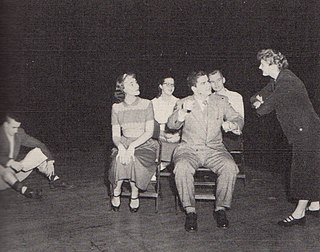
The Happy Journey to Trenton and Camden is a one act play by American novelist and playwright Thornton Wilder written in 1931. It was first published in The Long Christmas Dinner and Other Plays in One Act.

Jacques Louis Buttner was a French American physician and vegetarianism activist.
